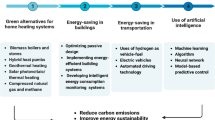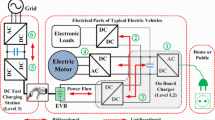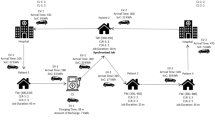Abstract
Widespread recharging of electric vehicle (EV) batteries could lead to frequent overloads, excessive power loss, and severe voltage fluctuations, especially at the distribution-system level. These challenges can be mitigated with smart charging initiatives, in which the system operator regulates EV charging with certain technical or economic objectives, provided that the EV owners are prepared to relinquish the charging control of their vehicles. Amidst concerns regarding the potential hike in electricity bills due to domestic EV charging, cost-minimizing objectives have been identified as compelling motivation for EV owners to participate in centralized charging programs. This paper presents a dynamic strategy for smart charging that can account for the uncertainties associated with vehicle mobility. The charging scheme aims to minimize energy costs with respect to a real-time pricing tariff while fulfilling the charge requirement of all EV users. The benefits of smart charging under both grid-to-vehicle (G2V) and vehicle-to-grid (V2G) modes are analyzed. Furthermore, the impact of smart charging on the distribution system is assessed in terms of system demand, distribution efficiency, and load voltage. Results indicate that the proposed technique can reduce the consumers’ energy bill by roughly one third. Although the smart V2G method leads to maximum saving, the inclusion of battery degradation cost tips the balance in smart G2V’s favor. Moreover, the pair of smart charging solutions improves distribution-system operation, with all the monitored metrics of power distribution showing significant improvement.











Similar content being viewed by others
References
García-Villalobos J, Zamora I, San Martín JI, Asensio FJ, Aperribay V (2014) Plug-in electric vehicles in electric distribution networks: a review of smart charging approaches. Renew Sustain Energy Rev 38:717–731
Bucher M, Vagapov Y, Davydova A, Lupin S (2015) Estimation of electrical energy demand by electric vehicles from households: a UK perspective. In: 2015 IEEE NW Russia Young researchers in electrical and electronic engineering conference (EIConRusNW). IEEE, pp 159–164
Ahmadian A, Mohammadi-Ivatloo B, Elkamel A (2020) A review on plug-in electric vehicles: introduction, current status, and load modeling techniques. J Mod Power Syst Clean Energy 8(3):412–425
Polat Ö, Eyüboğlu OH, Gül Ö (2021) Monte Carlo simulation of electric vehicle loads respect to return home from work and impacts to the low voltage side of distribution network. Electr Eng 103(1):439–445
Fischer D, Harbrecht A, Surmann A, McKenna R (2019) Electric vehicles’ impacts on residential electric local profiles-a stochastic modelling approach considering socio-economic, behavioural and spatial factors. Appl Energy 233:644–658
Verzijlbergh RA, Grond MO, Lukszo Z, Slootweg JG, Ilic MD (2012) Network impacts and cost savings of controlled EV charging. IEEE Trans Smart Grid 3(3):1203–1212
Deb S, Tammi K, Kalita K, Mahanta P (2018) Impact of electric vehicle charging station load on distribution network. Energies 11(1):178
Dubey A, Santoso S (2015) Electric vehicle charging on residential distribution systems: impacts and mitigations. IEEE Access 3:1871–1893
Erdogan N, Erden F, Kisacikoglu M (2017) A fast and efficient coordinated vehicle-to-grid discharging control scheme for peak shaving in power distribution system. J Mod Power Syst Clean Energy 6(3):555–566
Xu H, Xia X, Liang W, Zhang L, Dong G, Yan Y, Yu B, Ouyang F, Zhu W, Liu H (2020) Optimal charging of large-scale electric vehicles over extended time scales. Electr Eng 102(1):461–469
Kisacikoglu MC, Erden F, Erdogan N (2018) Distributed control of PEV charging based on energy demand forecast. IEEE Trans Ind Inf 14(1):332–341
Ali A, Raisz D, Mahmoud K (2018) Optimal scheduling of electric vehicles considering uncertain res generation using interval optimization. Electr Eng 100(3):1675–1687
Hajizadeh A, Kikhavani MR (2018) Coordination of bidirectional charging for plug-in electric vehicles in smart distribution systems. Electr Eng 100(2):1085–1096
Richardson P, Flynn D, Keane A (2011) Optimal charging of electric vehicles in low-voltage distribution systems. IEEE Trans Power Syst 27(1):268–279
De Hoog J, Alpcan T, Brazil M, Thomas DA, Mareels I (2015) Optimal charging of electric vehicles taking distribution network constraints into account. IEEE Trans Power Syst 30(1):365–375
Razeghi G, Zhang L, Brown T, Samuelsen S (2014) Impacts of plug-in hybrid electric vehicles on a residential transformer using stochastic and empirical analysis. J Power Sources 252:277–285
Suyono H, Rahman MT, Mokhlis H, Othman M, Illias HA, Mohamad H (2019) Optimal scheduling of plug-in electric vehicle charging including time-of-use tariff to minimize cost and system stress. Energies 12(8):1500
Zhang J, He Y, Cui M, Lu Y (2016) Primal dual interior point dynamic programming for coordinated charging of electric vehicles. J Mod Power Syst Clean Energy 5(6):1004–1015
Bakhshinejad A, Tavakoli A, Moghaddam MM (2021) Modeling and simultaneous management of electric vehicle penetration and demand response to improve distribution network performance. Electr Eng 103(1):325–340
Sarker MR, Olsen DJ, Ortega-Vazquez MA (2017) Co-optimization of distribution transformer aging and energy arbitrage using electric vehicles. IEEE Trans Smart Grid 8(6):2712–2722
Chen N, Tan CW, Quek TQ (2014) Electric vehicle charging in smart grid: optimality and valley-filling algorithms. IEEE J Sel Top Signal Process 8(6):1073–1083
He Y, Venkatesh B, Guan L (2012) Optimal scheduling for charging and discharging of electric vehicles. IEEE Trans Smart Grid 3(3):1095–1105
Jin C, Tang J, Ghosh P (2013) Optimizing electric vehicle charging: a customer’s perspective. IEEE Trans Veh Technol 62(7):2919–2927
Kiaee M, Cruden A, Sharkh S (2015) Estimation of cost savings from participation of electric vehicles in vehicle to grid (v2g) schemes. J Mod Power Syst Clean Energy 3(2):249–258
Turker H, Bacha S (2018) Optimal minimization of plug-in electric vehicle charging cost with vehicle-to-home and vehicle-to-grid concepts. IEEE Trans Veh Technol 67(11):10281–10292
Patil H, Kalkhambkar VN (2019) Charging cost minimisation by centralised controlled charging of electric vehicles. Int Trans Electr Energy Syst 30(2):e12226
Veldman E, Verzijlbergh RA (2014) Distribution grid impacts of smart electric vehicle charging from different perspectives. IEEE Trans Smart Grid 6(1):333–342
Liu M, Mcnamara P, Shorten R, Mcloone S (2015) Residential electrical vehicle charging strategies: the good, the bad and the ugly. J Mod Power Syst Clean Energy 3(2):190–202
Patil H, Kalkhambkar VN (2021) Grid integration of electric vehicles for economic benefits: a review. J Mod Power Syst Clean Energy 9(1):13–26
Sundstrom O, Binding C (2011) Flexible charging optimization for electric vehicles considering distribution grid constraints. IEEE Trans Smart Grid 3(1):26–37
Kristoffersen TK, Capion K, Meibom P (2011) Optimal charging of electric drive vehicles in a market environment. Appl Energy 88(5):1940–1948
US Energy Information Administration (EIA)—Independent Statistics and Analysis (2021) Prices and factors affecting prices. https://www.eia.gov/energyexplained/electricity/prices-and-factors-affecting-prices.php
Clement-Nyns K, Haesen E, Driesen J (2009) The impact of charging plug-in hybrid electric vehicles on a residential distribution grid. IEEE Trans Power Syst 25(1):371–380
Qian K, Zhou C, Allan M, Yuan Y (2010) Modeling of load demand due to EV battery charging in distribution systems. IEEE Trans Power Syst 26(2):802–810
Cao Y, Tang S, Li C, Zhang P, Tan Y, Zhang Z, Li J (2011) An optimized EV charging model considering TOU price and SOC curve. IEEE Trans Smart Grid 3(1):388–393
Santos A, McGuckin N, Nakamoto HY, Gray D, Liss S et al (2011) Summary of travel trends: 2009 National Household Travel Survey. Technical report, United States. Federal Highway Administration
CVX Research, Inc (2012) CVX: Matlab software for disciplined convex programming, version 2.0. http://cvxr.com/cvx
Ahmadian A, Sedghi M, Mohammadi-ivatloo B, Elkamel A, Golkar MA, Fowler M (2018) Cost-benefit analysis of V2G implementation in distribution networks considering PEVs battery degradation. IEEE Trans Sustain Energy 9(2):961–970
Luo Z, Hu Z, Song Y, Xu Z, Lu H (2013) Optimal coordination of plug-in electric vehicles in power grids with cost-benefit analysis-part I: enabling techniques. IEEE Trans Power Syst 28(4):3546–3555
Tomić J, Kempton W (2007) Using fleets of electric-drive vehicles for grid support. J Power Sources 168(2):459–468
Affonso CM, Kezunovic M (2018) Probabilistic assessment of electric vehicle charging demand impact on residential distribution transformer aging. In: 2018 IEEE international conference on probabilistic methods applied to power systems (PMAPS). IEEE, pp 1–6
Gustafson M, Baylor J, Mulnix S (1988) The equivalent hours loss factor revisited. IEEE Trans Power Syst 3(4):1502–1508
Sortomme E, Hindi MM, MacPherson SJ, Venkata S (2010) Coordinated charging of plug-in hybrid electric vehicles to minimize distribution system losses. IEEE Trans Smart Grid 2(1):198–205
EN50160 (2001) Voltage characteristics of electricity supplied by public distribution systems. CENELEC
Ul-Haq A, Cecati C, Strunz K, Abbasi E (2015) Impact of electric vehicle charging on voltage unbalance in an urban distribution network. Intell Ind Syst 1(1):51–60
Pillay P, Manyage M (2001) Definitions of voltage unbalance. IEEE Power Eng Rev 21(5):50–51
Funding
No funding was received to assist with the preparation of this manuscript.
Author information
Authors and Affiliations
Ethics declarations
Conflict of interest
The authors declare that they have no conflict of interest.
Additional information
Publisher's Note
Springer Nature remains neutral with regard to jurisdictional claims in published maps and institutional affiliations.
Rights and permissions
About this article
Cite this article
Visakh, A., Manickavasagam Parvathy, S. Energy-cost minimization with dynamic smart charging of electric vehicles and the analysis of its impact on distribution-system operation. Electr Eng 104, 2805–2817 (2022). https://doi.org/10.1007/s00202-022-01511-w
Received:
Accepted:
Published:
Issue Date:
DOI: https://doi.org/10.1007/s00202-022-01511-w




